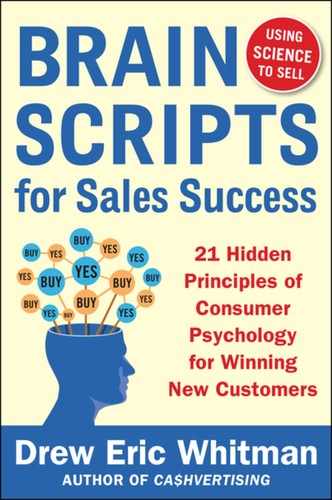PREFACE
Imagine. You’re cruising down a sunny highway with your left eye on the road, and your right eye glued to a fuel gauge that’s hovering ominously above “E.” In just under one mile, you’ll approach two adjacent gas stations that sell only one grade of gas: premium. One station’s premium is 90 octane, the other, 93. Question: which gas would you choose if there was no price difference?
“The better stuff—the higher octane, of course, Drew!”
That makes sense, right? Absolutely. Then why is it that so many salespeople go through their entire careers without ever putting the highest-octane sales techniques to work?
Why do they—day after day—continue to use the same old prospecting techniques … the same tired old pitches … and the same old closings … despite their burning desire to inflate their incomes to zeppelin-sized proportions?
Why do they accept just sputtering along like an old Ford Pinto, while the Lamborghinis—the top-ranked sales pros—outprospect, outmaneuver and outsell them every time? With decades of history supporting the effectiveness of tested principles of consumer psychology, why do so many salespeople never even inquire into what makes the human brain move from point A (disinterested) to point B, “Yes! Here’s my credit card!”?
Hey, it’s one thing if these ideas didn’t exist … if the desire for “the secrets” were nothing but an exercise in fruitless frustration. But … they do exist! And not only that, they’ve been made available in multitudes of forms since their discovery.
Right now, for example, you could go into any good library and find several books on the topic of consumer psychology. You could, more easily, Google these techniques and learn about many of them in the comfort of your own pajamas.
Of course, none of these methods is as convenient as reading this very book. Nor do any of those resources—no matter how diligently you search—contain actual scripts that you can incorporate into your own presentations.
Plus, few of them break down the principles into readily applicable “chunks.” Fact is, most of them are little more than academic brain food … cerebral chowder. They might make college professors happy, but they’re not devoted to real-world practicality, such as your desire to keep your baby fed and your mortgage note holder happy.
So, since these resources exist, how come not 1 in 100 sales-people will ever take the time to look for them? Why will they typically consider only what amounts to be the most superficial adjustments to their approach? Like “tweaking” their pitch, for example. Attempting to polish their rapport skills. Or adding or subtracting other elements that they, by pure conjecture, believe are responsible for the vast majority of their presentations resulting in a, “Not interested!” or, “Too expensive!” or, “Maybe some other time” response from prospects.
Why do so few of them think, “Hmmm … this isn’t working.Why am I not convincing these people? For that matter, how do you convince anybody? What’s happening—or not happening—inside these people’s brains that’s causing them to not grab for their wallets like a cowboy fast-drawing his six-shooter? Are there any principles of persuasion that could help me communicate the benefits of my product more effectively?”
And the most important question of all, one which can swing open the floodgates of sales success: “Is there anything scientifically proven to influence the consumer mind?”
Isn’t it odd that their chain of questioning never ventures in the direction of the very thing that’s keeping them from selling more: their prospects’ brains? Why is this?
The answer is, I believe, what legendary motivational speaker Jim Rohn simply called a “mystery of the mind.” So, rather than us spending time trying to psychoanalyze these people, I’ll simply congratulate you for not being one of them … encourage you to keep reading … and invite you to put yourself among the ranks that are ready to trade the crappy Pinto for the kick-ass Lamborghini.
Curiosity is one of the permanent and certain
characteristics of a vigorous mind.
Samuel Johnson
